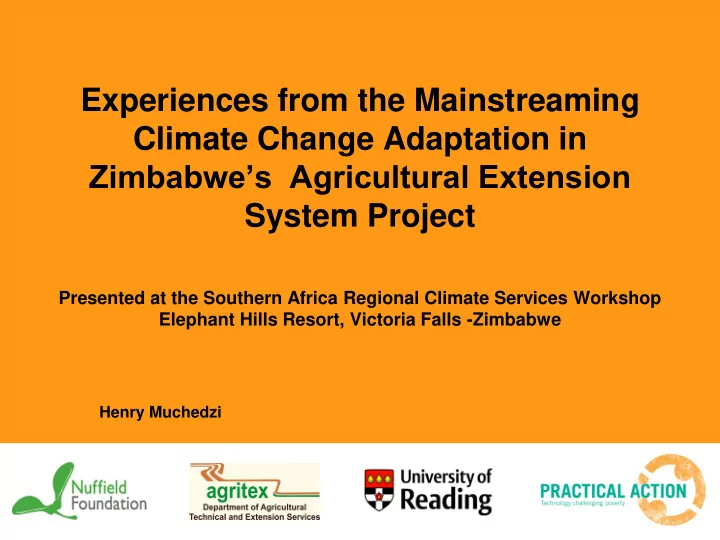

Experiences from the Mainstreaming Climate Change Adaptation in Zimbabwe’s Agricultural Extension System Project Presented at the Southern Africa Regional Climate Services Workshop Elephant Hills Resort, Victoria Falls -Zimbabwe Henry Muchedzi
Outline • Project objectives • Project approach • Project achievements • Conclusion 2
Project objectives • To integrate climate change adaptation in the Department of AGRITEX • To enable smallholder farmers to make better decisions and plans utilising climate information. The strategy was to: Build the capacity of AGRITEX staff on vulnerability and capacity assessment and use of climate information - (historical records and forecasts) Train SHF to utilize climate information, monitor rain gauges & trends, keep records to feed into farm planning and budgeting 3
Our approach with farmers Long Before Just before the season At start & during the Season the Season Historical Seasonal Participatory 10 -day Climate Forecast Planning & Forecast & early Data Budgeting warnings J u l 1 3 0 J u n 0 1 8 2 2 0 0 0 2 9 0 J u n 1 9 3 1 e m i 8 0 s 1 9 r e l o u e p a t 7 0 e d y 1 9 i e r M a e m 9 P r 2 0 9 6 1 b c d e f g ) 2 1 0 n s 9 5 d a y 1 r s M a o u 4 1 0 j 1 0 s ( 9 4 h e 1 e c e s n c u e 3 0 e q 1 9 s s r a n A p s 2 9 b c d e f g
1. Before 2. Before season season Analyse Train extension historical staff climate data 3. Before 5. After season season Review experience + Participatory National learning exercises with Workshop. Identify farmers, improvements in Discuss PSF process for the with farmers following season 4. During season MSD/NEWU send 10/5 day forecasts by SMS to farmers. Provide updated SCF
Project Achievements (1) • Significant impact on AGRITEX staff- a core group of practitioners trained - 224 prov & dist officers vs. a target of 170, 1,023 AEWs vs. 1560 AEWs in 3 pilot provinces • Engaging farmers to understand the presence and effects of CC appears to be a successful entry point to influencing farmer practices. Over 6,000 smallholder farmers trained by trained AEWs and some farmer groups developed plans to reduce exposure to risks and vulnerability to CC • Generalized recognition of the utility of the approach- uptake of approach by other development actors & mainstreaming in new projects 6
Conclusion • Appropriate technologies for coping with drought for livestock keepers required-In most cases what farmers need is the knowledge about existing technologies for adaptation. • Need for area specific meteorological data – do we have enough evidence to convince government to invest in Met infrastructure? • Explore mechanisms for effective & rapid dissemination of seasonal and 10 day weather forecasts • Develop simple materials for farmers and AEWs in local language • A potential sustainable approach - low cost and fits as part of extension activities & AGRITEX keen to see the 7 approach scaled up to cover more Provinces
Thank you Henry.Muchedzi@practicalaction.org.zw www.practicalaction.org
Recommend
More recommend